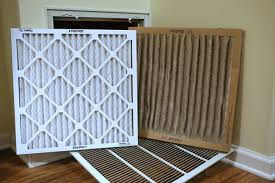Why It's Important to Change Your Air Filter Regularly
- hvacdiver
- Jun 27, 2024
- 3 min read

Almost half of the energy used in your home is for heating, cooling, and ventilation. One of the most important things you can do to save money and prolong the life of your HVAC system is to change its filter regularly. Filters do more than just trap dust and dirt from floating in the air, thereby improving air quality in the home. Filters also prevent larger particles like loose bits of insulation from being pulled into the house where it can become dangerous.
Our HVAC systems are like a breathing body; outside air comes in and then is released back out. All of the air circulated in our houses pass through a filter at some point. Dirt, pollen, mold, and pet hair are trapped on the air filter as air returns to the furnace unit. Over a period of time, the dirt trapped in the air filter soon begins to clog the filter, making it more difficult for air to be circulated throughout the house. If you do not regularly change your air filter it can cost you additional money each month because your unit is having to work that much harder, or worse yet stop working all together.
The number one job of the filter is to protect the furnace unit. A filter does much more than take particles out of the air. It prevents dust and dirt from accumulating on the blower wheel which circulates air, both hot and cold, through the vents in our house. A blower wheel can become so dirty that it actually reduces the amount of air being circulated in the house. Slower air can mean less heating or cooling in the house and also dust and dirt particles can build up in your air ducts. Dust and dirt that accumulates on the wheel also makes the blower motor work harder which increases your electric bill.
The second job of the filter is to protect the cooling coil inside your furnace. Air is passed through the air conditioning coil which turns the air cold and cools our house. Dirt and pet hair can clog the thin spaces between the fins on a coil, causing the coil to freeze up and not allow any air to pass through. This is typically the number one reason why people call a HVAC repairman during the summer months because "their house is not cooling."

Where is my filter located? Filters are located in one of two places where air returns to the furnace. It is either in the furnace itself, usually in the bottom, or in a return air duct. There is usually a small metal door on hinges that open up to the filter, if it is in the furnace. Or it is inside the grill that covers the return air vent in a wall or ceiling of your home.
What kind and size of filter should I get? Upon finding your old filter, it should be marked as to size. If not, check your owners manual for correct filter size. You can easily find a replacement filter at your local hardware store.
As to kind, there are many options to choose from these days. It has become quite popular to install pleated filters that capture particles down to a micron in size, but this may or may not be suitable for your unit. Some of these allergen type filters are so dense that it makes it hard on the system to pull air through them, like they are already clogged. Check your owners manual for recommended replacement filters or simply replace with the style of filter you are changing out. When installing the new filter, make sure you place the filter in the correct orientation. There is an arrow on the side of the filter which shows which direction the air is flowing.
How often should I replace my filter? It is estimated that humans shed 2-8 pounds of skin in a year. If you do not have any pets, changing your filter typically once every 60-90 days is sufficient. Here in West Texas during March and April we get frequent dust storms so you may want to do it more frequently during those months. If you have one pet, once every 30-60 days is advised; two or more pets you need to change your filter every 20-30 days. You will be amazed how must dust, hair, and particles accumulates on your filtering such a short time.
This is an easy task that can save you money not only in the long run but give you peace of mind knowing that you are not breathing "all that stuff" inside your home. If you have any other questions about replacing your filter, give us a call at Tim Johns Heating and Air and we will be glad to help.










Comments